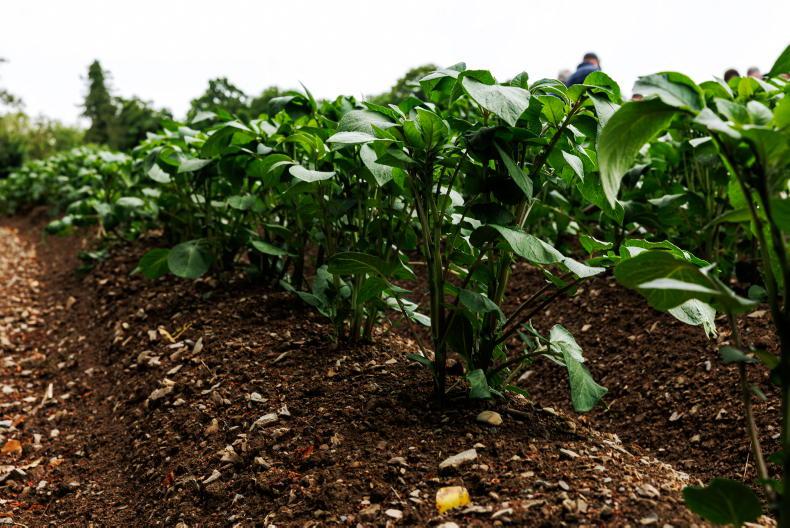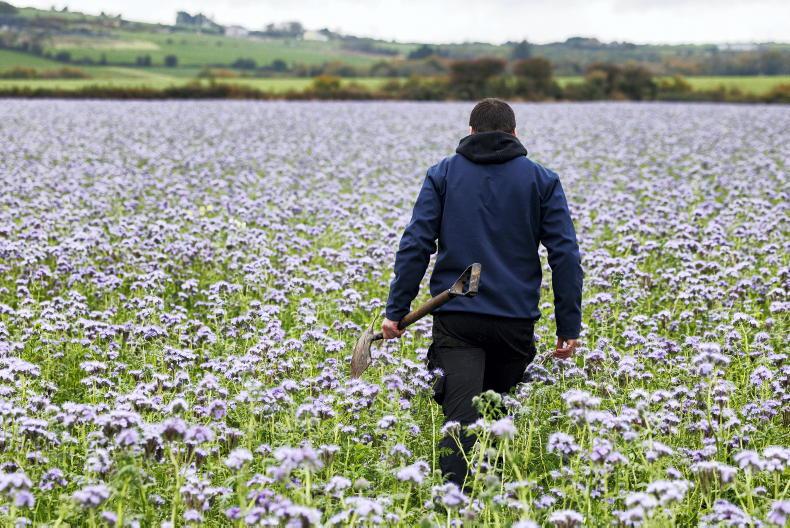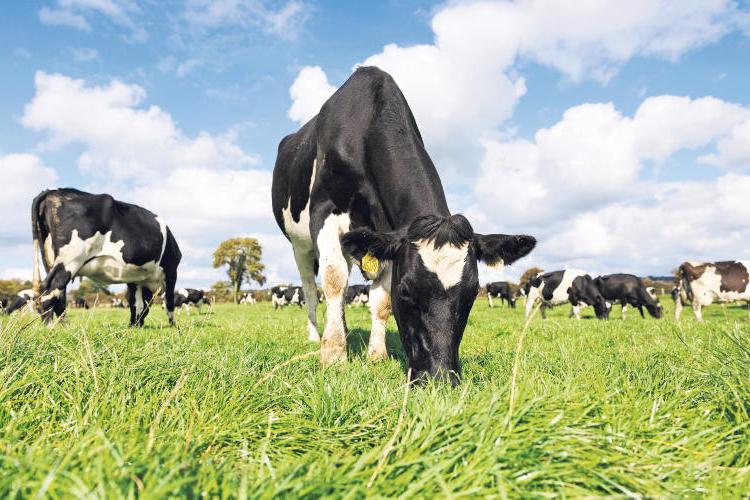The loss of the herbicide metribuzin will be a huge loss to potato and carrot growers in Ireland, Tom Murray, agronomist with O’Shea Farms, has said.
“Going forward metribuzin will be a huge loss. Metribuzin was the backbone of pre- and post-emergence on potatoes and carrots. There’s no alternative there for that.
“There’s replacements there, albeit they’ll cost more on the potatoes. On carrots, there’s no replacement,” he told those in attendance at the inaugural Irish Farmers Journal Tillage Day in the Killashee Hotel, Kildare, on Thursday.
He said that the removal of key tools from growers’ tool boxes is going to increase the cost of production on farms.
Costs
“The problem we have across all chemistry loss… is we don’t have the varieties that we can change to cope with the loss of chemistry.
“What I mean by that is we’ve actually created variety brands. Ninety per cent of the area of carrots in Ireland is actually the one variety called Nairobi. That’s been in production since the 1980s. We’re very caught.
“All it’s going to do is increase the cost of production, increase our carbon footprint, because we’ll have to do more passes with weeders and mechanical weeders,” he said.
Murray added that the increase in the minimum wage will also play a factor in the cost of production. Longer-term contracts need to be introduced to combat this, he said.
“We’ll always have the weather, climate change is a big issue, we’ll manage that but it’s everything else that comes with that is the problem.”

Blight
He also outlined that blight is becoming more of an issue for potato growers.
“Two or three years ago, if you asked the industry was blight a problem the answer would be no.
“In 2023, the EU43 [blight strain] was picked up. I picked it up on a farm last year. It is putting a challenge on a third of the chemistry we have for blight control.
“There’s very few new crops coming to the table. In terms of the varieties that we’re growing, they’re not blight-resistant. We are losing tools, but we’re not getting any new tools to try and improve,” he said.
Disorganisation
Murray also added that the potato industry is “severely disorganised” compared to the dairy industry.
“We need more joined-up thinking between primary producers, packers, the Department, the IFA, Bord Bia. We need to discuss the problems today, tomorrow, in five years’ time, 10 years’ time, across all field vegetables.
“We can’t continue the way we’re going, it’s not sustainable,” he said.
Brexit
He also outlined that Brexit has results in a divide with the UK.
“We’ve a divide with UK not being part of the EU, we’re starting to move away from what they have in terms of products, he said.
As a result, he said Irish potato growers don’t have access to potato seed from the UK and that Irish farmers were getting undermined by cheaper products coming in from Britain.
Read more
Commission bans herbicide for use on potato crops
New blight strain EU43 is causing concern
Growers urged to be vigilant for new potato blight strain
The loss of the herbicide metribuzin will be a huge loss to potato and carrot growers in Ireland, Tom Murray, agronomist with O’Shea Farms, has said.
“Going forward metribuzin will be a huge loss. Metribuzin was the backbone of pre- and post-emergence on potatoes and carrots. There’s no alternative there for that.
“There’s replacements there, albeit they’ll cost more on the potatoes. On carrots, there’s no replacement,” he told those in attendance at the inaugural Irish Farmers Journal Tillage Day in the Killashee Hotel, Kildare, on Thursday.
He said that the removal of key tools from growers’ tool boxes is going to increase the cost of production on farms.
Costs
“The problem we have across all chemistry loss… is we don’t have the varieties that we can change to cope with the loss of chemistry.
“What I mean by that is we’ve actually created variety brands. Ninety per cent of the area of carrots in Ireland is actually the one variety called Nairobi. That’s been in production since the 1980s. We’re very caught.
“All it’s going to do is increase the cost of production, increase our carbon footprint, because we’ll have to do more passes with weeders and mechanical weeders,” he said.
Murray added that the increase in the minimum wage will also play a factor in the cost of production. Longer-term contracts need to be introduced to combat this, he said.
“We’ll always have the weather, climate change is a big issue, we’ll manage that but it’s everything else that comes with that is the problem.”

Blight
He also outlined that blight is becoming more of an issue for potato growers.
“Two or three years ago, if you asked the industry was blight a problem the answer would be no.
“In 2023, the EU43 [blight strain] was picked up. I picked it up on a farm last year. It is putting a challenge on a third of the chemistry we have for blight control.
“There’s very few new crops coming to the table. In terms of the varieties that we’re growing, they’re not blight-resistant. We are losing tools, but we’re not getting any new tools to try and improve,” he said.
Disorganisation
Murray also added that the potato industry is “severely disorganised” compared to the dairy industry.
“We need more joined-up thinking between primary producers, packers, the Department, the IFA, Bord Bia. We need to discuss the problems today, tomorrow, in five years’ time, 10 years’ time, across all field vegetables.
“We can’t continue the way we’re going, it’s not sustainable,” he said.
Brexit
He also outlined that Brexit has results in a divide with the UK.
“We’ve a divide with UK not being part of the EU, we’re starting to move away from what they have in terms of products, he said.
As a result, he said Irish potato growers don’t have access to potato seed from the UK and that Irish farmers were getting undermined by cheaper products coming in from Britain.
Read more
Commission bans herbicide for use on potato crops
New blight strain EU43 is causing concern
Growers urged to be vigilant for new potato blight strain










SHARING OPTIONS